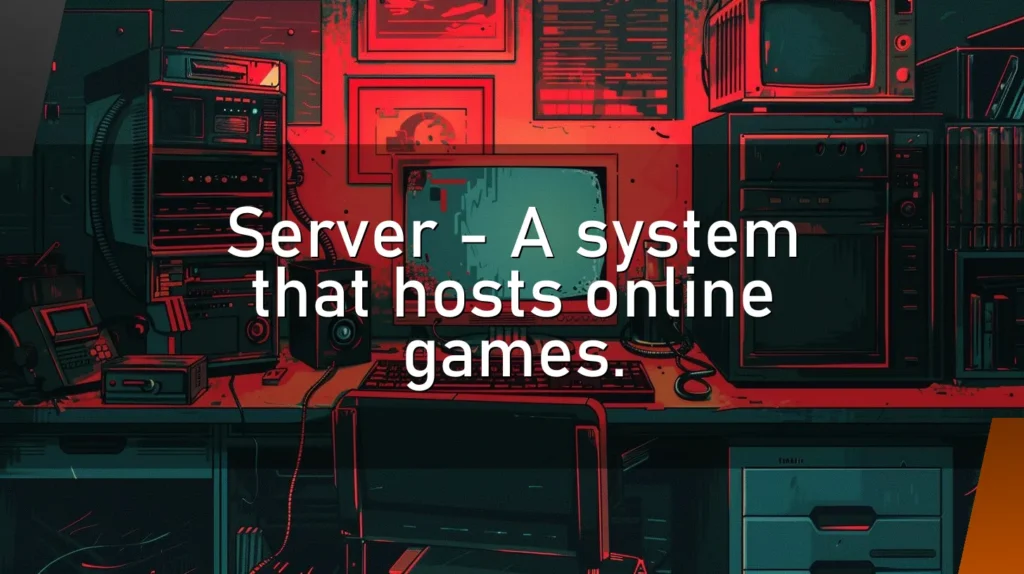Server – A System That Hosts Online Games 🤖
How a Nerd Would Describe
Oh, where do we begin? Imagine a powerful entity, tucked away in a secret lair (okay, maybe just a climate-controlled data center), tirelessly working to ensure that your online adventures in "Dragon Slayer 3000" and "Space Pirates: Return of the Jedi Knights" run smoothly. That’s a server for you—a superhero of the digital realm. It handles the heavy lifting, like game state management, matchmaking, and data storage, making sure your avatar doesn’t glitch into a wall or spontaneously combust.
Details
A server is a dedicated computer (or, in some cases, a cluster of computers) designed to manage and distribute data for online games. It performs a variety of functions, including:
- Game State Management: Keeps track of all players, their positions, actions, and the game environment.
- Matchmaking: Helps you find your next opponent or team for a multiplayer game.
- Data Storage: Stores player progress, high scores, and other vital information.
- Security: Protects against those pesky hackers and cheaters. 🛡️
- Load Balancing: Ensures that the game runs smoothly by distributing the load across multiple servers.
Other Similar Words Which Nerds Use
In the lexicon of a true gaming nerd, servers are often referred to by terms like:
- Dedicated Server: A server solely used for hosting games. Think of it as the VIP lounge for game data. 🎮
- Game Host: The central hub where the game lives and breathes.
- Server Farm: No, it doesn’t grow vegetables. It’s a collection of servers working together, usually in a large data center.
- Cloud Server: A server that’s hosted in the cloud, offering scalability and flexibility. 🌥️
👍 Correct Usage
- "I’m connecting to the North American server for better ping."
- "The server is down for maintenance; let’s play something else for now."
- "Our dedicated server for the clan battles is rock solid."
🛑 Wrong Usage
- "I need to reboot my server to fix my console game." (Nope, that’s probably your local device, not the server.)
- "The server is in my living room." (Unless you’re running a mini data center at home, probably not.)
The Pros and Cons
Advantages
- Reliable Performance: Servers are built from the ground up to handle massive amounts of data and ensure smooth gameplay.
- Security: Advanced measures are in place to protect your data and gameplay experience.
- Scalability: Servers can be adjusted to handle more players as a game gains popularity.
- Consistency: Keeps the game world consistent for all players, preventing time-travel-like glitches. 🕰️
Disadvantages
- Cost: Setting up and maintaining servers can be expensive, often reflected in the cost of the game or subscription fees.
- Downtime: Servers can go down for maintenance or unexpected issues, leaving gamers in the lurch.
- Latency Issues: The physical distance between you and the server can affect your game’s response time, known as ping. 🏓
Fun Facts and Technical Terms
Ping: This is the time it takes for your computer to communicate with the server and back. A lower ping means smoother gameplay.
Bandwidth: The amount of data that can be transmitted in a fixed amount of time. Higher bandwidth equals better performance.
Latency: The delay before a transfer of data begins following an instruction. It’s like waiting for your grandma to start the car after she says, "Let’s go!"
Common Misconceptions
"Local Games Don’t Need Servers"
While single-player games may not require an online server, many still use servers for updates, cloud saves, and even DRM (Digital Rights Management). 📡
"Servers Are Always in Use"
Servers can be dynamic, spinning up only when needed to handle peak loads or specific events. They’re not always sitting there twiddling their digital thumbs.
The Future of Game Servers
With the rise of cloud gaming platforms like Google Stadia and NVIDIA GeForce Now, servers are becoming even more critical. These platforms rely on powerful cloud servers to stream high-quality games directly to your device. This could revolutionize gaming by making high-end gaming accessible to anyone with a decent internet connection. 🌐
However, this also means that the demand for robust and reliable servers will increase, as will the need for better internet infrastructure worldwide.
Conclusion
In the grand tapestry of online gaming, servers are the unsung heroes. They handle the gritty details, ensuring your virtual worlds remain immersive and engaging. While they come with their set of challenges, the advantages far outweigh the drawbacks, making them indispensable in today’s gaming landscape.
So, the next time you’re battling alien invaders, slaying dragons, or outsmarting your friends in a tactical showdown, take a moment to appreciate the server working tirelessly behind the scenes. After all, without it, your gaming experience would be as exciting as watching paint dry. 🎨🎮
And remember, while your in-game character might be a fearless warrior or a cunning rogue, the real legend is the server keeping the game running smoothly. So here’s to you, dear server, the ultimate game master! 🏆🎉







